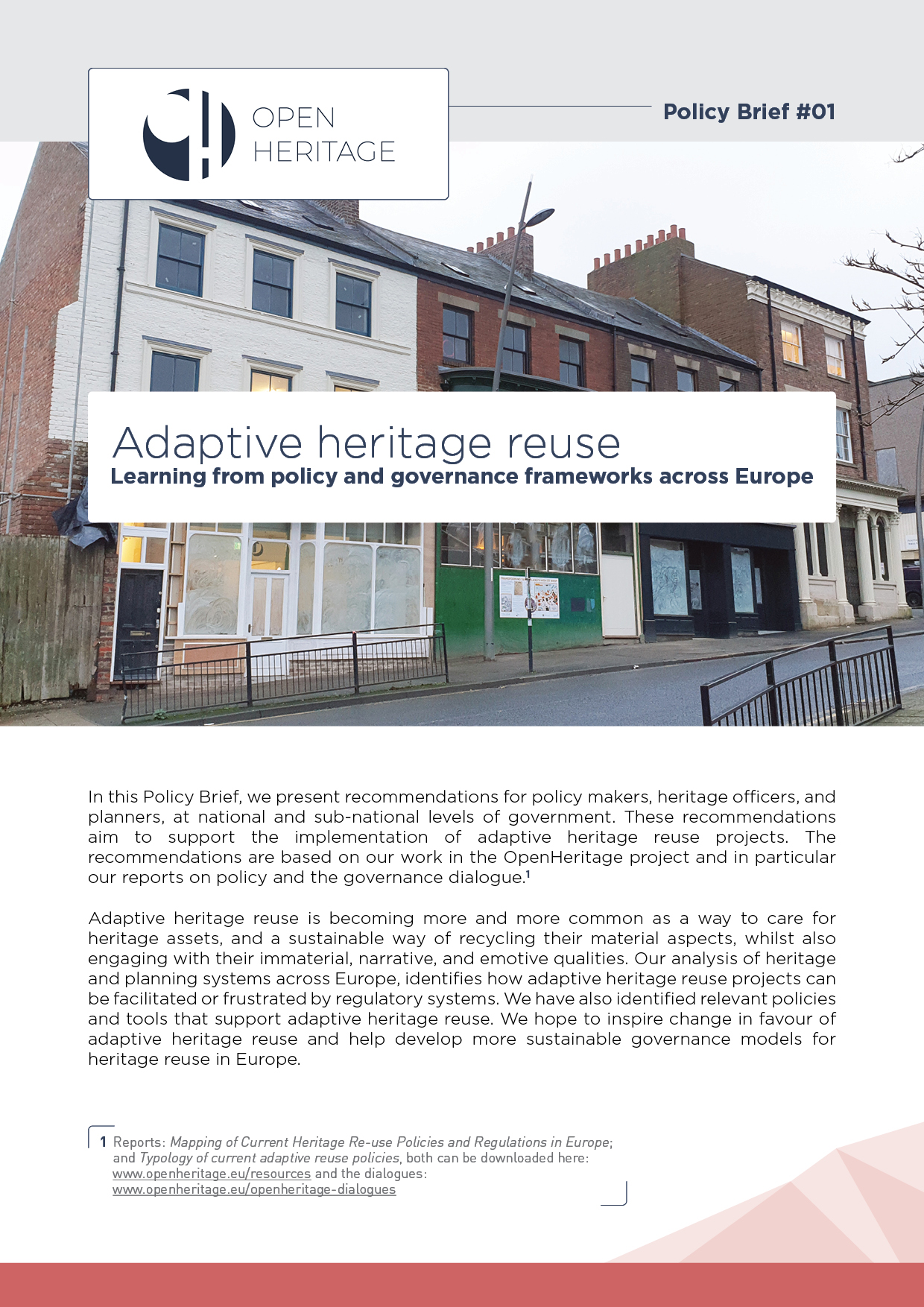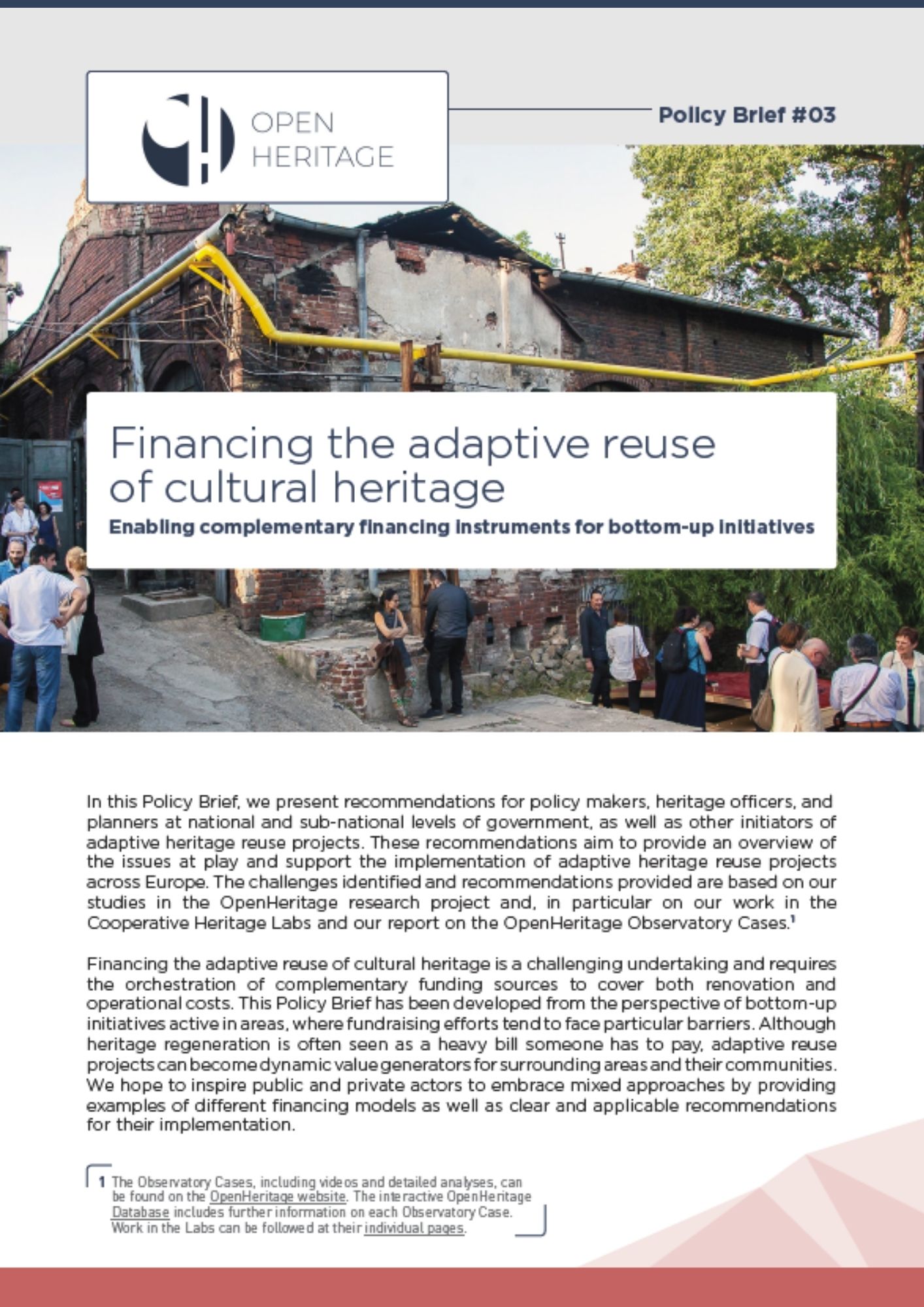Policy Briefs
Policy Brief #01
Adaptive Heritage Reuse: Learning from policy and governance frameworks across Europe
December 2020
Adaptive heritage reuse is becoming more and more common as a way to care for heritage assets, and a sustainable way of recycling their material aspects, whilst also engaging with their immaterial, narrative, and emotive qualities. Our analysis of heritage and planning systems across Europe, identifies how adaptive heritage reuse projects can be facilitated or frustrated by regulatory systems. We have also identified relevant policies and tools that support adaptove heritage reuse. We hope to inspire change in favour of adaptibe heritage reuse and help develop more sustainable governance models for heritage reuse in Europe.
Authors: Loes Veldpaus (Newcastle University); Olga Krajewska, Jasmin Miah (ICLEI Europe); Hanna Szemzö (MRI)
Policy Brief #02
Collaborative Heritage Reuse: Enabling strong partnerships
March 2021
Adaptive heritage reuse is a complex undertaking and involves various stakeholders. The variety of actors involved presents a challenge as well as an opportunity. NGOs, local communities, public bodies, private investors, heritage professionals and others all have different interests and priorities and it is not easy to reach consensus. At the same time, coming together to form effective and efficient partnerships for adaptibe heritage reuse can yield many benefits and create sustainable and vital cultural spaces within our cities and for our communities. We hope to inspire actors to embrace collaborations across fields by providing examples of different partnership models as well as clear and applicable recommendations for their implementation.
Authors: Dóra Mérai (CEU), Jasmin Miah (ICLEI Europe), Bahanur Nasya (Eutropian), Hanna Szemző (MRI)
Policy Brief #03
Financing the adaptive reuse of cultural heritage: Enabling complementary financing instruments for bottom-up initiatives
November 2021
Financing the adaptive reuse of cultural heritage is a challenging undertaking and requires the orchestration of complementary funding sources to cover both renovation and operational costs. This Policy Brief has been developed from the perspective of bottom-up initiatives active in areas, where fundraising efforts tend to face particular barriers. Although heritage regeneration is often seen as a heavy bill someone has to pay, adaptive reuse projects can become dynamic value generators for surrounding areas and their communities. We hope to inspire public and private actors to embrace mixed approaches by providing examples of different financing models as well as clear and applicable recommendations for their implementation.
Authors: Andrea Tönkő (MRI), Hanna Szemző (MRI), Rolf Novy-Huy (Stifting trias), Joep de Roo (Eurodite), Stephania Xydia (ICLEI)
Contributors: Loes Veldpaus (Newcastle University), Martin Hulse (TWBPT)
Policy Brief #04
A roadmap for the EU and Europe: Integrating adaptive heritage reuse in wider EU policies, programmes and practices
September 2022
AHR projects are about the past, the present and the future, where tangible and intangible heritage from the past that is valued now is sustained for the future while simultaneously given new purpose as part of ongoing social, economic, environmental and cultural transformation. As such, AHR can be a tool that contributes to achieving, for example, community engagement, higher quality of life regeneration, waste reduction, and/or emissions reduction. Reuse and renovation are already integrated to a certain extent within the European Green Deal, and the New European Bauhaus. We recommend that for this to be truly effective AHR, and in particular AHR that is locally-led, should be facilitated by, incentivised by and integrated in a much wider set of EU policies and strategies including, but not limited to, current Recovery and Resilience Facility, the Just Transition Fund, Research and Innovation and specifically Horizon Europe, Creative Europe, policies supporting SMEs and entrepreneurship, the Social Economy Action Plan, the new long-term Vision for Rural Areas, and, of course, Cohesion Policy.
Authors: Loes Veldpaus (Newcastle University)
Contributors: Miranda Iossifidis and Ashley Mason (Newcastle University); Maciej W. Hofman (freelance expert on culture)
Policy Brief #05
Regional integration of the adaptive heritage reuse projects: Strengthening sustainable local development
September 2022
In this Policy Brief, we present four models that shed light on different ways of integrating
adaptive heritage reuse practices into a larger territorial framework. They were created
for policy makers, heritage officers, and planners at local and regional levels of government,
to help them navigate the diverse landscape of Adaptive Heritage Reuse (AHR) projects
and find models that are the most suitable for their contexts.
The identified models are based on studies undertaken as part of the EU Horizon 2020
OpenHeritage research project, in particular the report on regional integration as well as our work in the Cooperative Heritage Labs and with the OpenHeritage Observatory Cases. With this Policy Brief, we hope to inspire actors to embrace the diversity of adaptive heritage reuse practices as well as the benefits of integrating them into larger territorial frameworks.
Authors: Hanna Szemző, Andrea Tönkő (MRI)
Contributors: Cristina Garzillo, Olga Krajewska, Katherine Peinhardt (ICLEI Europe)
PACKAGE OF ALL POLICY BRIEFS
OpenHeritage Policy Briefs 01 – 05
You can now download all OpenHeritage Policy Briefs with one click. The package includes:
- Policy Brief #01: Adaptive Heritage Reuse: Learning from policy and governance frameworks across Europe
- Policy Brief #02: Collaborative Heritage Reuse: Enabling strong partnerships
- Policy Brief #03: Financing the adaptive reuse of cultural heritage: Enabling complementary financing instruments for bottom-up initiatives
- Policy Brief #04: A roadmap for the EU and Europe: Integrating adaptive heritage reuse in wider EU policies, programmes and practices
- Policy Brief #05: Regional integration of adaptive heritage reuse projects: Strengthening sustainable local development






